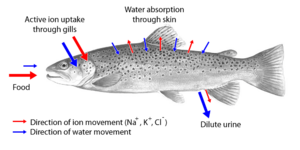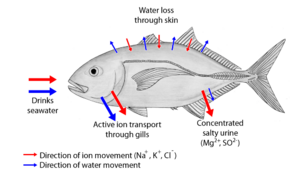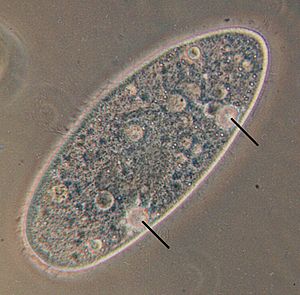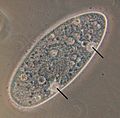Osmoregulation facts for kids
Osmoregulation is how living things keep the right amount of water and salt inside their bodies. It's like making sure your body's fluids have the perfect balance. This is super important for staying healthy!
Contents
How Bodies Balance Water and Salt
Your Kidneys: Water Balancers
Your kidneys are amazing organs that help with osmoregulation. They work like filters for your blood. When blood goes through your kidneys, they take out waste and extra water.
Imagine your kidneys are like a water recycling plant. They decide how much water to keep and how much to let go. This helps your body stay hydrated, but not too hydrated.
Special signals in your body, called hormones, tell your kidneys what to do. For example, if you don't have enough water, a hormone called ADH (Antidiuretic Hormone) tells your kidneys to save more water. This means less water leaves your body as urine. If you have too much water, your kidneys will let more go.
How Other Animals Manage Water
It's not just humans who need to balance water! Animals living in different places have special ways to do this.
Freshwater Fish
Fish that live in fresh water, like rivers and lakes, have a challenge. Their bodies have more salt than the water around them. This means water tends to flow into their bodies. To stop themselves from getting too watery, freshwater fish rarely drink. They also have kidneys that make a lot of watery pee. Their gills help them take in salts they need from the water.
Saltwater Fish
Fish that live in the ocean have the opposite problem. The ocean water is saltier than their bodies. So, water tends to flow out of them. To avoid drying out, saltwater fish drink a lot of ocean water. They have special gills that help them get rid of the extra salt they drink. Their kidneys make very little pee to save water.
Tiny Organisms
Even tiny, one-celled creatures like the Paramecium need to osmoregulate. They live in fresh water, so water is always trying to get inside them. A Paramecium has a special part called a contractile vacuole. This vacuole collects extra water inside the cell. When it's full, it squeezes the water out, like a tiny pump. This stops the Paramecium from bursting!
Images for kids
See also
 In Spanish: Osmorregulación para niños
In Spanish: Osmorregulación para niños
 | Bayard Rustin |
 | Jeannette Carter |
 | Jeremiah A. Brown |







